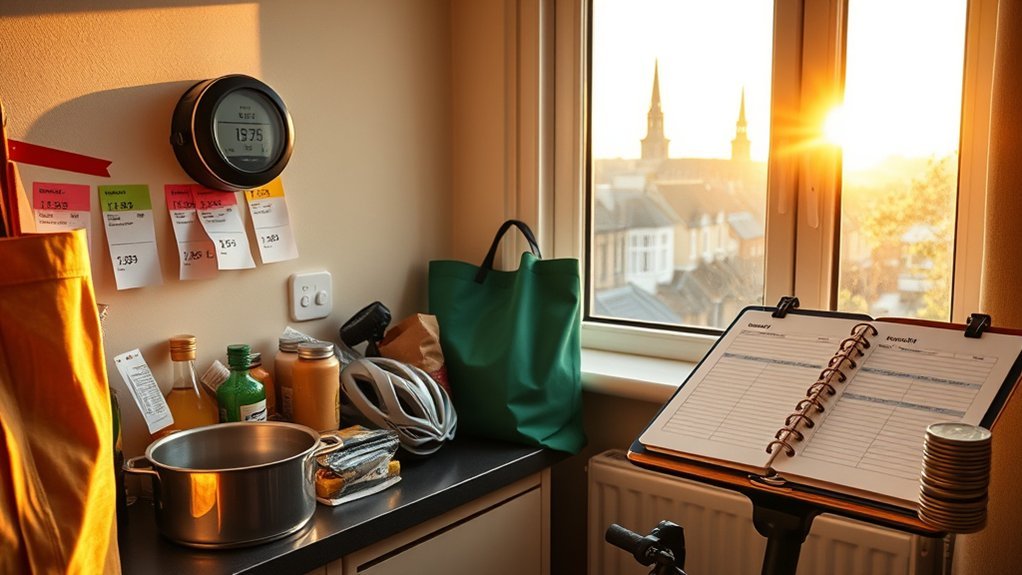You’ll typically need about £900–£1,000 a month for living costs excluding rent, and one-bed rents run roughly £742 outside the centre or £983 in the city, so total housing with utilities is about £1,008–£1,249 monthly. Groceries, transport, utilities and leisure push typical monthly budgets toward £1,600–£2,000. You’ll find student halls from ~£111/week and ways to save by sharing or living outside the centre — keep going to see specific line-item costs and tips.
Quick Answer
- Average monthly living costs excluding rent: £915 for a single person.
- Rent for one-bedroom: £983 in city centre, £742 outside.
- Total with utilities: £1,008–£1,249 monthly for housing.
- Student options: Halls from £111/week, often including utilities.
Monthly Housing and Rent Breakdown

How much will you pay to live in Norwich? You’ll find Norwich rent varies by location: a city centre one-bedroom is about £983 per month, while outside the centre it drops to roughly £742. If you need more space, a three-bedroom in the centre averages £1,693. Compare those figures to the average monthly net salary of £2,452 to assess affordability—city centre one-bedroom takes about 40% of net pay, three-bedroom around 69%.
When calculating monthly housing, add utilities: for an 85 m² apartment expect about £266 per month. That turns a city-centre one-bedroom into roughly £1,249 monthly housing outlay, and an outside-the-centre one-bedroom into about £1,008. These living costs remain notably lower than London’s—Norwich rent is approximately 52.5% cheaper—so you’ll generally get more space for your money while keeping total monthly housing and utilities manageable. See Numbeo cost of living data for more details.
Typical Student Accommodation Costs

If you’re budgeting as a student in Norwich, housing options look considerably cheaper than private-market rents: on-campus halls at the University of East Anglia start at about £111 per week (shared twin), while Norwich University of the Arts (NUA) rooms run roughly £162–£240+ per week across popular private halls. You’ll find student accommodation offers predictable weekly charges that often include utilities, furnishing and closer campus access, so you can compare to private rents (typical 1-bed outside the centre ~£742/month, city centre ~£983/month). Check University of East Anglia accommodation for current options.
Consider these practical points:
- Weekly on-campus from ~£111 gives a clear baseline for monthly planning; NUA at £162–£240+/week raises monthly costs toward private 1-bed levels.
- Shared student houses or NUA can cut individual rent versus solo private lets, improving affordability against Norwich’s lower overall cost of living.
- Factor in average net salary context (~£2,452/month) and regional rent advantages (about 52.5% cheaper than London) when choosing accommodation.
Food, Groceries and Market Prices

Wondering what your weekly food bill in Norwich might look like? You’ll find grocery prices that keep everyday food costs reasonable: a 1 L bottle of milk ~£1.44, a loaf of bread ~£1.72, 12 eggs ~£3.50, 1 kg rice ~£1.89, apples ~£2.18/kg, potatoes ~£1.39/kg and 1 kg cheese ~£8.50. Shopping at Norwich supermarkets like Asda, Tesco or Sainsbury’s will cover most staples affordably, and local markets add seasonal options.
If you buy beer in-store, a 0.5 L domestic bottle costs ~£1.97; imported 0.33 L bottles run near £5.45 in shops or pubs. For cost-conscious shoppers, Too Good To Go at the University of East Anglia and supermarket reductions cut waste and bills. Overall, plan weekly shop lists and combine supermarket deals with market produce to keep your monthly groceries predictable and your everyday food costs under control.
Eating Out and Nightlife Expenses
When you eat out in Norwich, expect a three-course meal for two at a mid-range restaurant to be about £60, while a cheap meal is roughly £15.
Drinks are reasonably priced — pints around £4.50, domestic beers in supermarkets about £1.97 per 0.5 L, cappuccinos £3.15 and a bottle of table wine near £10.
If you’re a student, you’ll often find entry and drink deals on Prince of Wales Road that can substantially cut nightlife costs.
Typical Meal Prices
A typical night out in Norwich will cost you noticeably less than in larger UK cities, with a mid-range three-course meal for two averaging about £60 and pints tending to fall between £4.50 and £5.50 depending on the venue. You’ll find meals ranged to suit budgets: casual cafes, mid-range restaurants, and occasional splurges. Compare these with groceries and rent when planning monthly costs so you don’t overspend dining out.
- Casual lunch or pub meal: ~£8–£14, useful when groceries are tight.
- Mid-range dinner for one: ~£18–£35, common for regular social evenings.
- Three-course for two (mid-range): ~£60, a helpful benchmark for budgeting.
Use these figures to balance meals against your monthly essentials.
Drinks and Bars
How much you’ll spend on a night out in Norwich depends on venue and timing: pints typically sit around £4.50, a 0.5L draught beer averages £5.50, and imported 0.33L bottles run about £5.45. You’ll find drinks ranges across bars and pubs; a cappuccino is ~£3.15 and meals cost extra. Local venues often post student discounts for entry and drinks in the evenings, so checking listings cuts costs. Norwich nightlife is concentrated and transport-friendly, letting you walk or cycle between spots rather than pay for travel. Use current venue prices to budget realistically: expect moderate-to-high drink prices but frequent promotional deals.
| Item | Typical price |
|---|---|
| Pint | £4.50 |
| Draught 0.5L | £5.50 |
Student Night Deals
Looking to save on nights out? You can stretch your monthly budget in Norwich by using student discounts and targeted nightlife deals that cut eating-out costs. With average rent and utilities known, factor modest nightly spends into your plan and compare to core Norwich living costs to keep net salary usable.
- Weeknight student nights: reduced-entry clubs, two-for-one drinks, themed cheap menus.
- Cheap eats near campus: £1–£6 snacks and shared plates that beat full restaurant bills.
- Transport & timing: use buses (single fares often capped at ~£3; monthly pass ~£70) or group taxis (~£11) to avoid late-night surcharges.
Use offers, track receipts, and prioritise nights that give the biggest savings for your monthly budget.
Utilities, Internet and Household Bills

You’ll typically pay about £266 per month for basic utilities (electricity, heating and water combined) in an 85 m² Norwich apartment.
Expect to add roughly £33 monthly for a 60+ Mbps unlimited broadband connection, while local transport runs about £3 per single ticket (often capped) or about £70 for a monthly pass, and routine purchases like a cappuccino (£3.15) and a 0.5L draught beer (£5.50) illustrate everyday household spending.
Typical Monthly Utilities
Wondering what your monthly household bills will look like in Norwich? You should budget utilities into your monthly budget alongside Norwich rent: basic utilities for an 85 m² flat average about £266 per month (usage-dependent); internet is billed separately. That helps you plan total housing spend (city-centre rent £983, outside the centre £742) and keeps surprises low.
- Utilities (water, heating, electricity) — ~£266/month for an 85 m² flat.
- Internet (60+ Mbps, unlimited) — ~£33/month (usually billed separately).
- Transport and small extras — monthly bus pass ~£70; one-way local tickets often capped around ~£3.
Use these figures to adjust your overall £900–£1,000 living-cost estimate excluding rent.
Internet and Connectivity Costs
How much will your home stay connected in Norwich? You can expect basic internet (60+ Mbps, unlimited) to cost about £33 per month. When planning your utilities, factor internet into the broader monthly cost: for an 85 m² apartment basic utilities average around £266, making combined internet and utilities roughly £299 monthly. That figure helps you compare living options—city-centre one-bed rent averages £983, outside the centre £742—so you’ll know what portion of rent-plus-essentials connectivity consumes. If you’re a student budgeting near £900–£1,000 monthly (excluding tuition), this combined internet and utilities line is a significant item. These numbers are current practical estimates for Norwich connectivity and household service costs; use them to set realistic monthly cost expectations.
Household Bills Breakdown
Since internet was singled out in the last section, let’s break down how it fits into your overall household bills in Norwich. Your Internet at about £33/month is a small but fixed slice of monthly spending compared with Utilities, which average £266 for an 85 m² flat (electricity, heating, water, trash).
Combine those with Rent and Transport to plan your budget.
- Typical city-centre one-bedroom Rent: ≈ £983.00/month; outside the centre: ≈ £742.00.
- Utilities for a standard 85 m² flat: ≈ £266/month (includes heating, cooling, water, trash).
- Monthly public Transport pass: ≈ £70, affecting disposable income and overall household affordability.
Use these figures to forecast totals and identify where you can trim costs.
Transport and Commuting Costs

Looking to get around Norwich affordably? You’ll balance transport and commuting costs against a typical monthly budget of about £900–£1,000. A monthly bus pass (about £70) usually beats one-way fares (often capped at ~£3) if you travel daily; students can access discounted passes. If you drive, factor gasoline (~£1.36/L) and parking; short trips add up fast. Utilities and internet (utilities ~£266 for an 85 m² flat; internet £33) aren’t transport but influence how much you can allocate to commuting. Use public transit for predictable costs; choose a monthly pass for regular routes and compare student offers. If you need a car occasionally, budget fuel and occasional public fares. Track weekly spending for a month to see whether a pass or pay-as-you-go saves you more.
| Option | Typical Cost |
|---|---|
| Monthly bus pass | £70 |
| One-way ticket | ~£3 (cap) |
| Gasoline (per L) | £1.35–£1.40 |
| Internet (monthly) | £33 |
Health, Personal Care and Services

Aside from travel costs, you’ll also want to budget for health and personal care, which can take a noticeable slice of that typical monthly net salary of £2,452. In Norwich, public NHS services cover basics, but you’ll still face costs for prescriptions, over-the-counter items, and private services if you prefer shorter waits or specialist care. Plan predictable monthly spending alongside occasional one-off treatments.
- Prescription charges (England): £9.90 per item; consider a Prescription Prepayment Certificate if you need multiple items monthly.
- Personal care essentials: toiletries, dental hygiene products, and skincare typically run £15–£40 monthly for a single person.
- Private services and appointments: a GP private visit, private physio or dental work can range from £40 to £150 per appointment.
Use this data to allocate a monthly health and personal care buffer — roughly £50–£120 — within your Norwich budget, adjusting for age, chronic conditions, and any planned procedures.
Entertainment, Gym and Leisure Activities

Want to know how much you should set aside for fun and fitness in Norwich? You’ll find entertainment and leisure activities moderately priced: a pint of beer averages £4.71 and a three-course meal for two at a mid-range restaurant is about £60. If you go out twice a week and grab a drink once, budget around £60–£100 monthly for socialising.
| Item | Typical cost |
|---|---|
| Pint of beer | £4.71 |
| Mid-range restaurant (meal for two) | £60 |
| Gym membership (monthly) | £20–£40 |
| Leisure activities (events, cinema) | £15–£50 |
Gym membership ranges widely; basic gyms hit £20–£40 per month. Combine classes, a few nights out, and occasional events and you’ll likely spend £50–£150 monthly on leisure activities depending on frequency. Use these figures to adjust your broader £900–£1,000 monthly baseline excluding rent and tuition.
Budgeting Tips and Money-Saving Resources

How much can you realistically save each month in Norwich? You can aim to save by comparing accommodation costs (city-centre £983 vs outside £742) and by matching student budgeting to typical monthly living expenses of £900–£1,000. If you secure outside-centre rent and keep living costs near £900, you may free up £100–£200 monthly versus pricier options.
- Choose weekly student halls (UEA from ~£111/week, NUA £162–£240+/week) vs private flats to control Norwich cost and predictable weekly/monthly living expenses.
- Use a monthly bus pass (~£70) instead of frequent ~£3 one-way tickets or taxis (~£11 per 8 km) to cut travel spending.
- Shop budget supermarkets and track staples (milk £1.05–£1.44/L, tomatoes £2.08/kg, apples £1.78–£2.18/kg, cheese £5–£8.50/kg) to trim grocery bills.
Use a simple spreadsheet, set targets tied to maintenance loans (up to £10,544/yr), and review rent vs utility trade-offs monthly.
Comparison to Other UK Cities
Norwich offers lower costs than many UK cities. It is about 39% cheaper than London overall. Rent in Norwich is 52.5% lower than in London. Compared to other university cities, Norwich is more affordable than places like Manchester or Bristol. Public transport and groceries align with national averages but benefit from local competition.
Frequently Asked Questions
What Is the Average Cost of Living in Norwich?
You’ll pay about £1,500–£1,700 monthly: average rent £742–£983, monthly groceries around £200–£300, utility costs £266, and transportation expenses roughly £70 for a monthly pass, data-driven and practical.
What Is the Cost of Living in Norwich, CT (USA)?
Norwich, CT’s cost of living varies, but you’ll find housing affordability lower than nearby metros; expect higher utility expenses and transportation costs; use a cost comparison tool to estimate totals based on rent, utilities, and commute.
Is Norwich a Cheap Place to Live?
By and large, yes — you’ll find cheap housing, affordable student meals, reasonable transport costs and modest entertainment prices; with rents and utilities lower than London, you’ll stretch a £2,452 net salary further while budgeting sensibly.
How Much Does Living Cost in the UK With Rent?
You’ll pay roughly £1,200–£2,500 monthly including rent, reflecting housing affordability variations; expect low grocery prices in smaller cities, modest transit costs, and variable leisure expenses depending on lifestyle and location.
Conclusion
Think of your Norwich budget as a well-tuned bicycle: rent and bills are the frame, groceries and transport the wheels, and occasional treats the bell that keeps you motivated. Keep tire pressure—track expenses, compare rents, use student deals—and you’ll go further for less. Small maintenance steps, like switching providers or cooking more, shave costs without slowing you down. Ride deliberately, monitor spending, and your monthly journey through Norwich will stay steady and sustainable.


